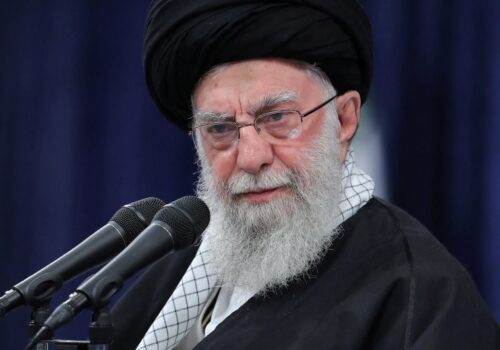How American diplomacy can stabilize Lebanon—and the Middle East
The events of the past two weeks have witnessed an unprecedented degradation of Iran’s so-called Axis of Resistance. These developments present the Biden administration with more complex policy choices, but also some strategic opportunities. The reason why is because Israel is back at a point where it is not only deterring Iran, but dismantling key elements of Iran’s own deterrent network, particularly in Lebanon. How Israeli operations end will depend as much on US diplomacy as on Israeli military prowess.
The Biden administration inherited a region in upheaval. The “maximum pressure” campaign of the Trump years had not caused the Iranian regime to collapse. Despite the Trump administration’s 2020 killing of Iranian General Qasem Soleimani, Iran was increasing support to its proxies across the region and creating additional instability in Yemen, Iraq, and Syria. As the Biden administration planned its 2021 withdrawal from Afghanistan and began to move forces away from the Middle East to Europe and Asia, it looked for ways to depressurize the region with the goal of reducing the need for a large military footprint in the Middle East.
These plans were only moderately successful. In 2022, Saudi Arabia and the Houthis arrived at a still-enduring ceasefire. Additionally, Saudi Arabia and Iran agreed to resume diplomatic relations. However, attempts to negotiate expanded normalization between Israel and its neighbors ended with the October 7, 2023, Hamas terrorist attack. In response, the Pentagon rushed forces back to the region to ensure Israel’s security. Since Israel assumes that the United States is likely to remove these forces as soon the October 7–created security crisis subsides, Israel is relying on the temporary protection of US carrier strike groups and air expeditionary squadrons to increase its freedom of action against Iran.
Congruence between the Biden administration and Israel
After Israel’s recent military escalation against Hezbollah, the White House posture has shifted from calling for a ceasefire, toward one of support for Israel’s operations in Lebanon. The Biden administration appears to have arrived at a position of making the most of Israel’s new second front. In retrospect, Israel’s second front, and the Biden administration’s support for it, was inevitable for several reasons.
Israel has several reasons to turn from Gaza toward Lebanon. Symbolically, Israel has yet to eliminate Hamas’s remaining senior leader and October 7 architect, Yahya Sinwar. Israel has approached the limits of its ability to militarily free the remaining hostages held by Hamas. Finally, the inability to arrive at an agreed-upon ceasefire, despite the best efforts of the United States, Qatar, and Egypt, meant that Israel would focus on other threats sooner or later. Although Gaza has received the preponderance of Israeli military focus, signs that Israel intended to begin turning to its other threats have been growing for months.
The strike against senior Lebanese Hezbollah leader Fuad Shukr, who was killed in Beirut on July 30, revealed that Israeli intelligence had penetrated Lebanese Hezbollah’s leadership network. Iran’s decision not to retaliate for Israel’s assassination of Hamas’s political leader, Ismail Haniyah, in Tehran on July 31, appeared to give Israel freedom of action to plan additional assassinations. What came next in Lebanon was beyond the expectations of anyone who has watched the decades of animosity of between Lebanese Hezbollah and Israel over the past several decades.
Starting with the pager attacks on September 18 and followed by the walkie-talkie attacks on September 19, it is clear that Israel had broadly penetrated Hezbollah’s supply chain and internal network. The goal of these attacks was both to disrupt Hezbollah’s command and control and to create enough fear to force Hezbollah’s senior leaders to shelter in positions where they could be targeted. This approach culminated in the killing of Hezbollah leader Hassan Nasrallah on September 27. Iranian General Abbas Nilforoushan of the Islamic Revolutionary Guard Corps (IRGC) was also killed with Nasrallah. Following this strike, the Israel Defense Forces (IDF) turned its attention to a ground operation into southern Lebanon.
Israel had to conduct the ground operations in Lebanon because of the Hezbollah buildup of fighters and materiel along the Blue Line. Because Hezbollah began launching rockets at Israeli civilians in northern Israel on October 8, 2023, displacing approximately 90,000 citizens from their homes, some form of the current IDF operation in southern Lebanon must have been considered for almost a year. The need for such an operation is likely the main reason why the Biden administration has given Israel its quiet support. During the October 1 press briefing, the Pentagon’s press secretary, Major General Patrick Ryder said, “[W]e fully support Israel’s right to defend itself against Hezbollah. As we understand it, they will be conducting limited operations to destroy Hezbollah infrastructure that’s arrayed along the border there that could be used to threaten Israeli citizens.”
What to expect next for Israel, Lebanon, and Iran
IDF operations in Lebanon are nothing like in Gaza. Given Lebanon’s status as a sovereign state and given the delicate political and security environment inside its borders, Israel’s current operations against Hezbollah need to be conducted with discriminate use of force against valid military objectives. Further, even successful, discriminate military operations in southern Lebanon will not eliminate Hezbollah as a long-term threat. Hezbollah will still have strongholds in Beirut and in other parts of Lebanon. Consequently, a limited-scale operation, which the Biden administration appears to be supporting, will need to be reinforced with US diplomacy in Lebanon and the region to create a new paradigm for security inside Lebanon.
Fortunately, the framework for this new, albeit limited paradigm already exists.
United Nations Security Council Resolution (UNSCR) 1701 was adopted following Israel’s 2006 ground campaign in Lebanon. The failure to fulfill all of UNSCR 1701’s provisions explains, in part, why Israeli forces have been drawn back into Lebanon. The following elements from UNSCR 1701 are crucial:
- The requirement for the disarmament of all armed groups in Lebanon, so “there will be no weapons or authority in Lebanon other than that of the Lebanese State”
- Full respect by both parties for the Blue Line and “security arrangements to prevent the resumption of hostilities,” including an area free of any armed personnel, assets, and weapons other than those of the Lebanese authorities and the United Nations Interim Force in Lebanon between the Blue Line and the Litani River
For the time being, Israeli military operations will focus on clearing Hezbollah fighters and weapons from the Blue Line area of southern Lebanon. Since this operation will not produce a permanent solution, expect the following additional actions:
First, Israel will respond against Iran. Israeli Prime Minister Benjamin Netanyahu has been clear about this intention, and the Biden administration has publicly voiced its support. National Security Advisor Jake Sullivan noted on October 1 that there would be severe consequences for the Iranian attack.
Second, wide-ranging Israeli strikes against Lebanese Hezbollah and IRGC-affiliated targets in Lebanon and Syria will continue for as long as Israel needs to disrupt Iranian resupply to Hezbollah. Israel will use these strikes to eliminate rocket and missile stockpiles outside of southern Lebanon.
On the US side, diplomatic efforts must ramp up with Israel and with other regional states, and now especially with Lebanon. These efforts must work to define the end point for the current escalation. This will mean stepped-up efforts to either rebuild a counter-Hezbollah faction in Lebanon, or to force Hezbollah to accept some limits over its actions, such as those articulated in UNSCR 1701. The success of these efforts will only be possible if Israeli operations in Lebanon do not alienate the population like they have in the past. If those conditions are met, this approach is more likely to result in a political end state that can be supported by both Lebanon and Israel.
In addition, any pending Israeli operations against Iran should be calibrated to avoid a broadening of the conflict outside of the current antagonists. Here, again, the United States has a role to play regarding Israeli restraint.
Finally, expect a return to Gaza ceasefire negotiations. If a stable outcome in Lebanon is reached, alongside a scenario in which Iran is deterred but not forced to militarily escalate, there is every reason to believe that Gaza negotiations will be more successful for Israel and the United States.
Daniel E. Mouton is a nonresident senior fellow at the Scowcroft Middle East Security Initiative of the Atlantic Council’s Middle East Programs. He served on the National Security Council from 2021 to 2023 as the director for defense and political-military policy for the Middle East and North Africa for Coordinator Brett McGurk.
Further reading
Wed, Oct 2, 2024
What is Iran thinking now?
Fast Thinking By Atlantic Council
Tehran launched nearly two hundred missiles at Israel on Tuesday. Atlantic Council experts consider the ways that the barrage—which was largely ineffectual—offers a window into Iranian thinking.
Tue, Oct 1, 2024
Four questions (and expert answers) about Israel’s ground operation in Lebanon
New Atlanticist By Shalom Lipner
Shalom Lipner, a former advisor to seven consecutive Israeli prime ministers, answers the burning questions about Israel’s strategy and what the US should do.
Sat, Sep 28, 2024
Hezbollah is diminished, decapitated, and in disarray—but still dangerous
New Atlanticist By William F. Wechsler
The death of Hassan Nasrallah leaves Hezbollah weakened, but as Israel’s history with the Iran-backed group demonstrates, decapitation operations are often necessary to win the battle but always far from sufficient to win the peace.
Image: US Secretary of State Antony Blinken walks, before departing, at Ben Gurion International airport, Tel Aviv, Israel, March 22, 2024. REUTERS/Evelyn Hockstein/Pool





